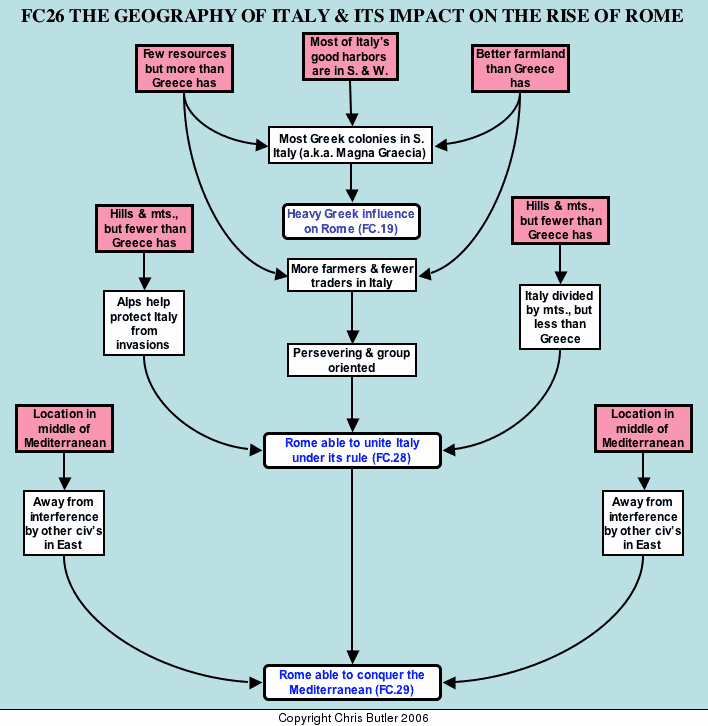FC26The Impact of Geography on Ancient Italy
Introduction
When we think of the Greeks, we think of a bold, intelligent people who gave us so much in the way of art, architecture, drama, democracy, science, and math. When we think of the Romans, we think of empire builders. They were a more down to earth people who may have done little that was original compared to what the Greeks did. But they built and maintained an empire that peacefully embraced the entire Mediterranean Sea for some two centuries, an accomplishment unparalleled in history. The Romans also spread civilization into Western Europe. In that sense, they were the bridge between the older cultures of the ancient Near East and our culture, known as Western Civilization.
There is probably no story that better illustrates what the early Romans were all about than that of the founding of Rome by the twin brothers, Romulus and Remus. According to this legend, there was disagreement over where to found the city. When omens from the gods failed to settle the dispute, Romulus just started digging the pomerium (sacred boundary) of Rome where he thought the gods wanted it. Remus mockingly leaped over this trench and Romulus killed him, declaring that such a fate should befall all who dared to breach the walls of Rome. The story of Romulus and Remus shows that the Roman sense of honor, duty, and loyalty to Rome ran even deeper than family and kinship ties. Other Roman legends also had this theme of honor and duty running through them: the story of Horatius, who single-handedly defended a bridge against invading Etruscans in order to buy his city time to prepare a defense; the consul Brutus who had his own sons executed for plotting treason against Rome; and Lucretia, who committed suicide rather than live with dishonor to herself and Rome. Such stories idealize the Roman character, but also raise the question of what factors shaped it and pushed Rome to greatness. And, of course, the first place to look is the environment surrounding Rome and its people.
Geopolitics
At the time of its founding around 750 B.C.E., there was little to hint that Rome and Italy would be the center of the greatest empire in antiquity. Italy did have good soil along with some resources and good harbors in the South. These features attracted Greek colonists whose culture would exercise an immense influence on Roman civilization. Also, Italy's soil tended to make its people farmers rather than artisans and merchants.
These factors, in particular the close ties to the soil, largely molded the Romans' personality as a people. While it is dangerous to stereotype a whole people's character, there are certain values and circumstances that any people as a whole share which helps define how they think and act. The quick-witted Greeks, whom the sea and lack of resources forced into becoming clever and resourceful traders, looked upon the agricultural Romans as slow and dull. But there were several characteristics that would help the Romans become great empire builders. First of all, being farmers bred a certain ability and willingness to persevere through hardships. Nothing shows this better than Rome's dogged perseverance and eventual victories in its first two wars against Carthage, wars which dragged on for 23 and 17 years respectively. Agriculture tended to make the Romans somewhat more conservative and wary of change. They were also a tightly knit society, more willing to submit to the rule of law than the quarrelsome Greeks ever were. This Roman discipline produced magnificent soldiers and the most efficient and effective armies in the ancient world. It also produced an intense desire for the rule of law that made the Romans possibly the greatest lawgivers in history. Many Western European countries today base their law codes directly on earlier Roman law codes.
One other characteristic marked the Romans for greatness: a willingness to adapt other peoples' ideas for their own purposes. All people borrow ideas, but few have been so adept at it as the Romans. Their art, architecture, technology, city planning, and military tactics all owed a great deal to other peoples' influences. Indeed, there was little that the Romans did that was totally original. But the sum total of what they did was uniquely Roman and marked them out as one of the most remarkable peoples in history.
Italy's topography also had an impact. The Alps to the North provided some protection, although occasionally invaders, such as the Gauls and Carthaginians, did break in. Another mountain range, the Apennines, ran along the length of the peninsula much like a backbone. While this had the effect of dividing Italy into various city-states, it was not nearly to the extent that Greece was broken up by its mountains. These two factors, plus the Roman character, allowed Rome to unite Italy relatively free from outside interference
Finally, Italy's location favored it in two ways. It had a strategic position that divided the Mediterranean into western and eastern halves. Also, it was far enough away from the older civilizations of antiquity to allow it to develop on its own without too much outside interference. Therefore, once Italy was unified, its geographic position allowed Rome to unite the Mediterranean under its rule.
